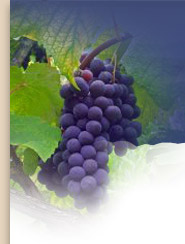Why wine is different to other alcoholic beverages
'Beer is made by man - wine is made by God"
– Martin Luther (1483- 1546)
Scholar and Religious Reformer
Man has been consuming wine for about 9,000 years, beer for about 6,000 years and spirits for about 3,000 years. Wine is man's oldest medicine, having been used as such for over 5,000 years.
Wine should be regarded as a food. Historically it has been regarded as such and has been an integral part of the healthful Mediterranean diet for thousands of years. Wine also has important religious connections, being used to represent the blood of Christ in holy communion.
Dr. Maynard Amerine, Professor Emeritus of Oenology and Viticulture at the University of California at Davis described wine as "a chemical symphony composed of ethylalcohol, several other alcohols, sugar, other carbohydrates, polyphenols, aldehydates, ketones and pigments, with half a dozen vitamins, fifteen to twenty minerals more than twenty-two organic acids and other things that have not yet been identified". (1)
A full table of wine's composition by Dr. Bryce Rankine, former Dean of the Faculty of Oenology at Roseworthy Agricultural College, follows at the end of this paper. (2)
Professor Walter Willett, Chairman of Harvard University's Department of Nutrition as stated "Wine ....can't be forgotten as an important part of the Mediterranean diet. (3)
Professor Curtis Ellison, Head of Epidemiology at Boston University says "a Mediterranean diet, high in fruit, vegetables and grains, also typically includes one or two glasses of wine per day". (4)
Australia's Dr. William Lennox Cleland, Medical Superintendent at the Glenside (psychiatric) Hospital in Adelaide thought of wine as a food when he addressed the Royal Agricultural and Horticultural Society on 27/8/1880 with a paper titled "Some remarks upon wine as a food and its production"
"The centuries-old belief that wine used with meals is an aid to nutrition has been confirmed by research project at the University of California in Berkeley.
In the first such study ever made a litre of Zinfandel wine or a litre of an equivalent (11.5 percent) aqueous solution of ethanol were fed daily with a controlled isocaloric diet to six healthy young adult males while their faeces, urine, and sweat were collected and analysed.
The results showed that all of the subjects had absorbed from their diet significantly more of such nutrients as calcium, phosphorus, magnesium, iron and zinc after taking the wine than after taking the alcohol solution.
Equally significant was that when dealcoholized wine and deionized water were substituted for the wine and for the alcohol solution during part of the 75-day study, the results were similar. Significantly greater absorption of nutrients was found after the dealcoholized wine than after the water".(5)
Wine should also be regarded as separate from other alcohol containing beverages, because wine is unique in that it is the only alcoholic beverage to not only contain alcohol but also nature's most potent antioxidants, namely resveratrol, quercitin and eipcatechin. Wine also has the best mode of consumption because it is usually sipped slowly over a long period of time accompanying a meal, whereas beer and spirits do not contain these potent antioxidants and are usually consumed on an empty stomach thus greatly increasing their alcohol's absorption rate.
The main components that give wine its health benefits are alcohol and the polyphenol antioxidants. Alcohol is responsible for reduced clot formation (by increased fibrinolysis, reduced fibrinogen and reduced platelet aggregation), raised good cholesterol (HDL) levels and reduced bad cholesterol (LDL) levels-all of which help reduce vascular disease. The antioxidants are responsible for the rest of the health benefits of wine.
As Louis Pastuer stated wine is also "the most healthful and hygienic of all beverages". This has been shown very clearly by the Copenhagen Study, which was the first study ever to compare the death from all causes rates of beer, wine and spirits. It is a very robust study being large in size, long in duration and involving both men and women. Dr. Marten Gronbaek the study's director summed up the findings thus: -
"Low to moderate intake of wine is associated with lower mortality - up to 50% - from cardiovascular and cerebrovascular disease and other causes. Similar intake of spirits implied an increased risk - up lo 34% - while beer drinking did not affect mortality".(6)
Why is this so? The antioxidants (polyphenals) which are only in wine are five times more potent than the standard benchmark antioxidants VitC and VitE, plateauing at 100% antioxidant activity after a few glasses and these antioxidants reduce insulin resistance thus help to significantly reduce diabetes, block damage being done to DNA in our cell nuclei thus reduce cancer and increase the activity of MAP kinase thus help reduce dementia by up to 80% (an incredible figure). (7)
Antioxidants, especially resveratrol in wine, stimulate a nerve enzyme called Mitogen Activated Protein (MAP) kinase which stimulates nerve cells and helps them regenerate their dendrites or nerve interconnections. Thus Dr. Alberto Bertelli from University of Milan, the world authority on the subject states "By daily reinforcing these contacts we can prevent neurodegeneration" (Such as dementia and Parkinson's disease).
Free Radicals are the poisonous waste products from our metabolism which cause biological havoc to our bodies. The antioxidants from wine neutralize the effect of these Free Radicals, thus protecting our bodies from degeneration and aging i.e. cyto protection or preventing cell death.
Macular Degeneration causes blindness in 30% of all people over the age of 65 (that is a lot of blindness). It cannot be treated once it is established, but it can be prevented and the only thing that helps prevent it is consuming wine in moderation which reduces the Macular Degeneration rate by up to 34%. (8)
The biggest health benefit from consuming wine in moderation daily though comes from the up to 50% reduction in vascular disease. This is not only coronary heart disease but the whole vascular tree to include the brain (strokes), aorta (aneurysms), veins (DVT) and kidneys (50% of renal failure is due to vascular disease). Vascular disease is the biggest cause of death in our society accounting for about half of all deaths.
Latest medical research is showing that vascular disease is a chronic inflammatory disease, like rheumatoid arthritis, involving the internal lining of the vessel wall called the endothelium. Thus the new focus of research now is emphasizing the anti inflammatory effect on the endothelium to prevent rupture of atherosclerotic plaque and subsequent clotting that results in the obstruction of the blood vessel and death of the tissue supplied by that vessel. The antioxidants in wine significantly reduce this inflammation and clotting, thus reducing vascular disease deaths by up to 50%. This is a whole new exciting area of benefit and role for wine's antioxidants, not only involving complementary antioxidant mechanisms but also new alternative biological mechanisms for wine's polyphenols.
Normally bad cholesterol (LDL) is oxidised and then incorporated into the vessel wall to form atherosclerotic plaque which eventually swells up, then ruptures. This rupture is closed off by clot which is the final event that causes an occlusion of the vessel. Now the endothelial inflammation theory explains why someone can have a large stable, full of scar tissue binding it together, plaque for decades which does not rupture and someone else can have a small but unstable or inflamed plaque, which does rupture at an early age.
The antioxidants, which occur in wine, prevent the oxidation of the bad cholesterol so it cannot be incorporated in the vessel wall, reduce the bad cholesterol, raise the good cholesterol (which helps reabsorb plaque), reduce the inflammation of the endothelium and act as anticoagulants. So it can be seen that the antioxidants, unique to wine, have at least five major ways in which they help prevent vascular disease.
The only downside to consuming wine is if it is abused, but if it is consumed in moderation daily then only health benefits will result. So enjoy your red or white wine in moderation daily- Mother Nature's health drink i.e. let the food, wine, be your medicine. Wine needs to be consumed daily as the antioxidants (like vitamins) cannot be stored and hence need to be ingested daily.
To paraphrase Abraham Lincoln "The problem of alcoholism is not the use of a bad thing, but the abuse of a very good one".
In summary - wine is different to all other alcoholic beverages because it also contains nature's most potent antioxidants and it is consumed in the most healthful way.
SUMMARY OF BENEFITS
- Reduced vascular disease which kills up to 50% of us resulting:
i. Reduced Coronary Heart Disease by up to 50% (9)
ii. Reduced Ischaemic Stroke (Ischaemic strokes account for 90-95% of all strokes) (10)
iii. Reduced Deep Vein Thrombosis by up to 50% (11)
iv. Reduced Osteoporosis (12)
v. Increased Intellect in the Elderly (7)
vi. Reduced Macular Degeneration (a common cause of blindness) by up to 34% (8)
vii. Reduced Renal Failure (up to 50% of renal disease) (13) - Tonic - wine contains many substances including most vitamins, minerals, trace elements, proteins and carbohydrates (1)
- Fat and cholesterol free source of carbohydrate (1)
- Reduced cancer, such as reduced prostate cancer by up to 50%, because the Antioxidants in wine block free radicals causing damage to the cell's nucleus (12)
- Reduced blood pressure (15)
- Antiseptic due to alcohol and more importantly polyphenols (16)
- Increases morale and appetite - nursing home and hospital patients (25) + (5)
- Wine contains Quercetin, Resveratrol and Epicatechin, which are Nature's most potent antioxidants and also act as anti-carcinogens (17)
- Reduction in colds by up to 85% (18)
- Diabetes reduced by up to 50% because the antioxidants reduce insulin resistance. Dry wine best alcoholic drink that is allowed with diabetes as all the sugar has been converted to alcohol. (19)
- Reduced gallstones by up to 30% (20)
- Reduced kidney stones by up to 39% (21)
- Reduced Alzheimer's disease and multi infarct (stroke) forms of dementia by up to 80% (7)
- Reduced Parkinson's disease (22)
- Improved digestion (5)
- Reduced H. Pylori infection of the stomach and duodenum leading to reduced ulcers (23)
- Improved physical and intellectual condition in the elderly (7)
- Reduced Hepatitis A (24)
- Reduced stress and depression (25)
- Reduced essential tremor (26)
- Reduced tooth decay (27)
- Reduced cancer of the prostate by up to 50% (28)
References
(1) McDonald, J., Nutrition, A Symposium on Wine, Health and Society Wine Institute, Washington. D.C. February 24, 1986
(2) Rankine, B., Making Good Wine. A Manual of Winemaking Practice for Australia and New Zealand. Pan MacMillan Aust. P/L, 1993.
(3) Willett, W., Harvard's New Mediterranean Diet Guidelines Include Wine, Research News Bulletin, The Wine Institute, Vol.2, No.1, January 1993
(4) Ellison, R., Alcohol in the Mediterranean Diet, American Journal of Clinical Nutrition, (65) pp 13785- 12825, 1995
(5) Wine in Nutrition Study, Bulletin of the Society of Medical Friends of Wine, Vol. 17 No.1, February 1975
(6) Gronbaek, M., Mortality Associated with Moderate Intakes of Wine, Beer or Spirits. British Medical Journal, Vol.3l0, 6th May 1995, pp1165-1169
(7) Orgogozo, M., etal Wine Consumption and Dementia in the Elderly: A Prospective community study in the Bordeaux area, Revue Neurologique, Vol.153 No.2,1997
(8) Obisesan, T.O., etal Moderate wine consumption is associated with decreased odds of developing age-related macular degeneration in National Health and Nutrition Examination Survey (1971-1975). Journal of the American Geriatrics Society 1998,46(1),pp1-7
(9) Renaud, S. Wine, Alcohol, platelets, and the French paradox for coronary heart disease. The Lancet Vol.339, 20 June 1992, ppl523k-1526
(10) Rodgers H., Alcohol and Stroke: A case Control Study of Drinking Habits past and Present. Stroke Vol.24,l993.pp 1473-1477
(11) Maalej, N., Antithrombotic Effect of Flavonoids in Red Wine, Wine Nutritional and Therapeutic Benefits, American Chemical Society, Washington D.C.1997
(12) Alcohol and Stronger Bones - The Newly Emerging Evidence, Wine Issues Monitor, The Wine Institute, San Francisco 1997
(13) Bertelli, A., etal; Resveratrol, a component of Wine and Grapes, in the Prevention of Kidney Disease in Alcohol and Wine in Health and Disease. Annals of the New York Academy of Sciences, 2002 Vol.957pp230-238
(14) Renaud, S, Alcohol and Mortality in middle aged men from Eastern France, Epidemiology, 1998,Vo1.9,No.2
(15) Jackson, R, Alcohol consumption and blood pressure. American Journal of Epidemiology, Vol.122,NO.6,4th April, 1985,pp1037 -1044
(16) Weisse, M., etal, Wine as a digestive aid comparative antimicrobial effects of bismuth salicylate and red and white wine, British Medical Journal, 1995 Vol.311,pp1657- 1660
(17) California Wines and their antioxidant activity in inhibiting oxidation of Human Low-Density Lipoproteins, Journal of Agricultural Food Chemistry, 1995 Vo143pp890-894
(18) Takkouche, B., etal., Intake of Wine, Beer and Spirits and the Risk of Clinical Common Cold, American Journal of Epidemiology 2002, Vol.l55, No.9,pp853-858
(19) Rimm, E., etal., Prospective study of cigarette smoking, alcohol use and the risk of diabetes in men. British Medical Journal, 1995, Vol310,pp555-559
and Lazarus,R., etal, Alcohol intake and insulin levels: the Normative Aging Study, American Journal of Epidemiology, 1997, Vol145,pp909-916
(20) Maclure, K. etal., Weight Diet and the Risk of Symptomatic Gallstones, New England Journal of Medicine, August 19
(21) Curham, G., etal., Prospective study of beverage use and the risk of kidney stones, American Journal of Epidemiology, 1996, Vol.143.,No.3,pp240-247
(22) Bertelli, A., etal, Resveratrol, Map kinases and neuronal cells: might wine be a neuroprotectant? Drugs under Experimental and Clinical Research. 1999, Vol.XXV (2/3)pp99-103
(23) Brenner, H., etal. Alcohol consumption and Helicobacter Pylori infection: Results from the German National Health and Nutrition Survey, Epidemiology, 1999, Vol.10 pp214-218
(24) Alcohol in Moderation Gateway website
(25) Lipton, R., The effect of moderate alcohol use on the relationship between stress and depression. American Journal of Public Health, 1994, Vo184,pp1913-1917
(26) Ford.G., The Science of Healthy Drinking, Wine Appreciation Guild 2003 Chapter 26 Essential Tremors pp261-266
(27) Daglia,M, et al, Antibacterial Activity of Red Wine and White Wine against Oral Streptococci, J.Agric.Food Chem.,2007,55,5038-5042
(28) Stanford,J.L., Alcohol Consumption and Risk of Prostate Cancer in Middle Aged Men, Int.J. Cancer, 2004 Aug 25
Dr Philip NORRIE
MBBS,MA,MSc,MSocSc[Hons],PhD,MD, currently doing M.Phil

























